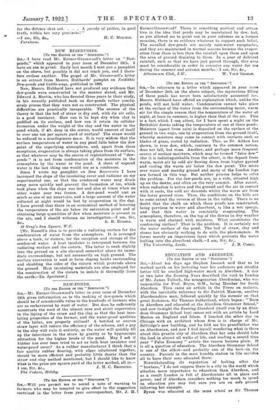[To THE EDITOR or THE " SPECTATOR."' SIR, —In reference to
a letter which appeared in your issue of December 24th on the above subject, the mysterious filling of these ponds has never been satisfactorily accounted for. Messrs. Hubbard have offered an explanation which, unlike the ponds, will not hold water. Condensation cannot take place at the surface of the water from the surrounding moist, warm air for the simple reason that the temperature of the water at night, at least in summer, is higher than that of the air. This is a fact which I can attest, for I have spent a night on the Berkshire downs taking the temperature of one of these ponds. Moisture (apart from rain) is deposited on the surface of the ground in two ways, one by evaporation from the ground itself, whereby moisture may come in contact with surfaces such as blades of grass, cooled by radiation. This, as Dr. Aitken has shown, is true dew, which, contrary to the common notion, does not fall, but rises. Another, and perhaps more frequent source of surface moisture, which may be termed "false dew^ (for it is indistinguishable from the other), is the deposit from warm, moist air by cold air flowing down from higher ground and cooling the warm air below the dew point. The mists over water and marshy ground and many of the London fogs are formed in this way. But neither process helps to solve the problem. For the dew-ponds are, as a rule, situated high up on the downs, and often on the very summit. After sunset, when radiation is active and the ground and the air in contact with it cools, the cold air descends whilst the warm air from the lower ground rises. Thus, the conditions on the hills are to some extent tho reverse of those in the valley. There is no doubt that the chalk on which these ponds are constructed, being pervious to water and absorbent, is like a wet sponge, and that this water is constantly evaporating. The atmosphere, therefore, on the top of the downs in dry weather is warm and charged with moisture. What constitutes the condensing surface? That is the problem. It is certainly not the water surface of the pond. The bed of straw, clay and stones has obviously nothing to do with the phenomenon. It forms merely an impervious layer which prevents the water leaking into the absorbent chalk.—I am, Sir, &c.,










































 Previous page
Previous page